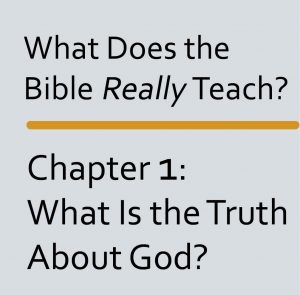In an earlier post in this series, I said, “The best way to prepare to discuss a study book chapter actively is to read it through and take notes on what the Witnesses will try to get across and why. Then—using my book and blog as resources—decide what you want to get across and why. Then prepare your discussion points accordingly.”
As you do this preparation, you’ll discover that Chapter 1 of “Bible Teach”—“What Is the Truth About God?”—covers five main topics:
- The need to ask important questions and keep seeking the answers
- God’s role in bad things that happen
- The importance of God’s name—“Jehovah”
- How to draw close to Jehovah
- Resisting opposition to studying with Jehovah’s Witnesses
Today, I’ll discuss Topics #1-#2. In the next post, I’ll cover Topics #3-#5.
Topic #1: The need to ask important questions and keep seeking the answers
Chapter 1 begins by trying to make sure that you commit to a long-term study with Jehovah’s Witnesses. In paragraphs 1-2 (p. 8), it points out that children ask lots of questions but that as we get older we stop asking important questions or at least we stop seeking answers.
Paragraph 3 (p. 9) warns that “some feel that [the Bible’s] answers are too hard to understand. Others worry that asking questions could lead to shame or embarrassment. And some decide that such questions are best left to religious leaders and teachers. What about you?”
You can use these comments as a springboard to establish that we can understand the Bible without the Watchtower to tell us what it means and that you have the right to ask your own questions. Using the student role teaching method, you can establish these points by asking:
- “Can we understand the Bible ourselves or do we need religious leaders’ teachings to tell us what it means?”
- “Are there any questions I’m forbidden to ask during this study?”
If they get defensive, you can deflect the focus on the Watchtower by commenting that sometimes Mormons get upset when you ask them upsetting question about Joseph’s Smith’s background, and you want to make sure the Witnesses don’t have similar taboo topics. Most likely, the Witnesses will tell you that you can ask them anything. If they get upset by something you ask during the course of your student, you can remind them that they told you this.
Earlier in this series, I explained how Watchtower study books contain study questions designed to make you a passive learner who gives the Watchtower’s answers to the Watchtower’s questions. If the Witnesses insist on asking these questions, you should give your own responses rather than merely repeating the Watchtower talking points.
Paragraph 4 (p. 9) provides an example of what I was talking about. The text says, “No doubt you sometimes wonder: ‘What is the purpose of life? Is this life all there is? What is God really like?’” The corresponding study questions ask, “What are some of the most important questions we can ask in life, and why should we seek the answers?”
The Witnesses will expect you to repeat and answer the questions from the paragraph.
Instead, I recommend that you establish your independence by giving your own response. Mine would be, “I think the most important question we face is how to have a right relationship with God. When you think about it, nothing else matters.”
Obviously, you need to prepare for your study ahead of time and have notes on what you want to say in order to do this effectively.
Topic #2: God’s role in bad things that happen
Paragraph 7 (p. 10) tries to drive a wedge between you and religious leaders of non-Watchtower religions. It says, “…religious leaders sometimes lead people to think that God is hardhearted. How so? When tragedy strikes, they say it is God’s will… Granted, he does allow bad things to happen. But there is a big difference between allowing something to happen and causing it.”
This isn’t a major topic, so if you want you can let it go. But if you want to challenge the Watchtower’s simplistic answers to perplexing questions, you can say, “I think people who say it’s God will may be thinking of verses like Isaiah 45:7 and Amos 3:6.” Ask the Witnesses to read those verses aloud from the Watchtower’s New World Translation:
- Isaiah 45:7: “I form light and create darkness, I make peace and create calamity; I, Jehovah, am doing all these things.”
- Amos 3:6: “…If a calamity occurs in the city, is it not Jehovah who has acted?”
These (and similar verses) will plant the seed that God’s judgment against evil is often far more severe than the Watchtower wants to believe.


Leave a Reply
2 Comments on "Establish Your Right to Ask Anything"
Thanks David, I read every one of your posts!
You’re welcome, Rob, and thanks so much for reading the posts. I hope you find them helpful.